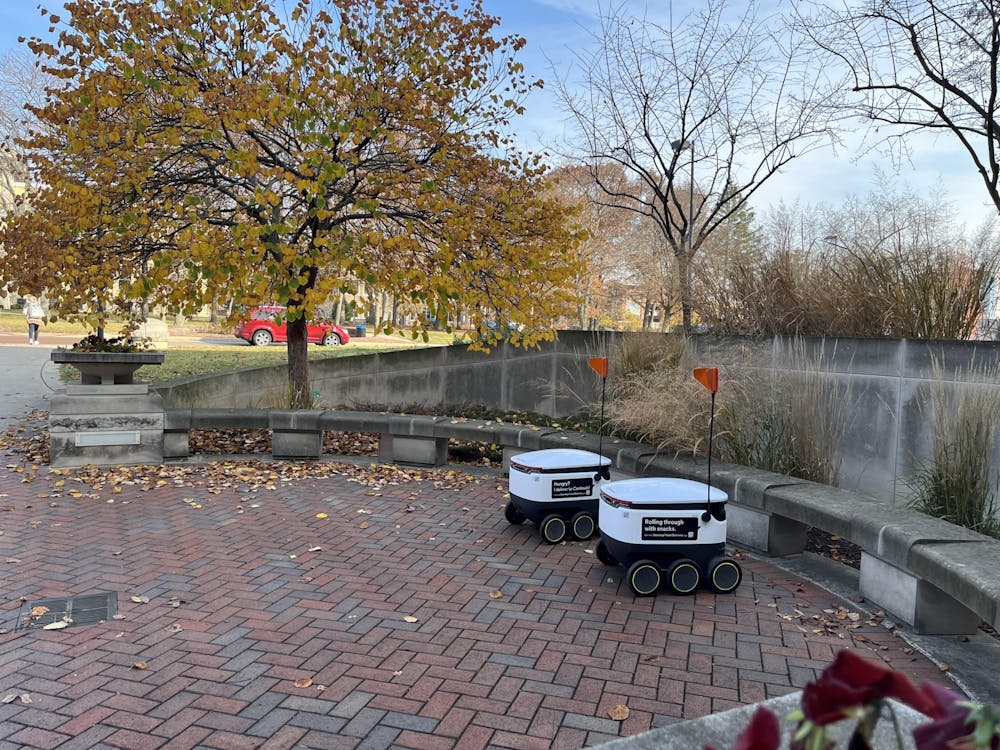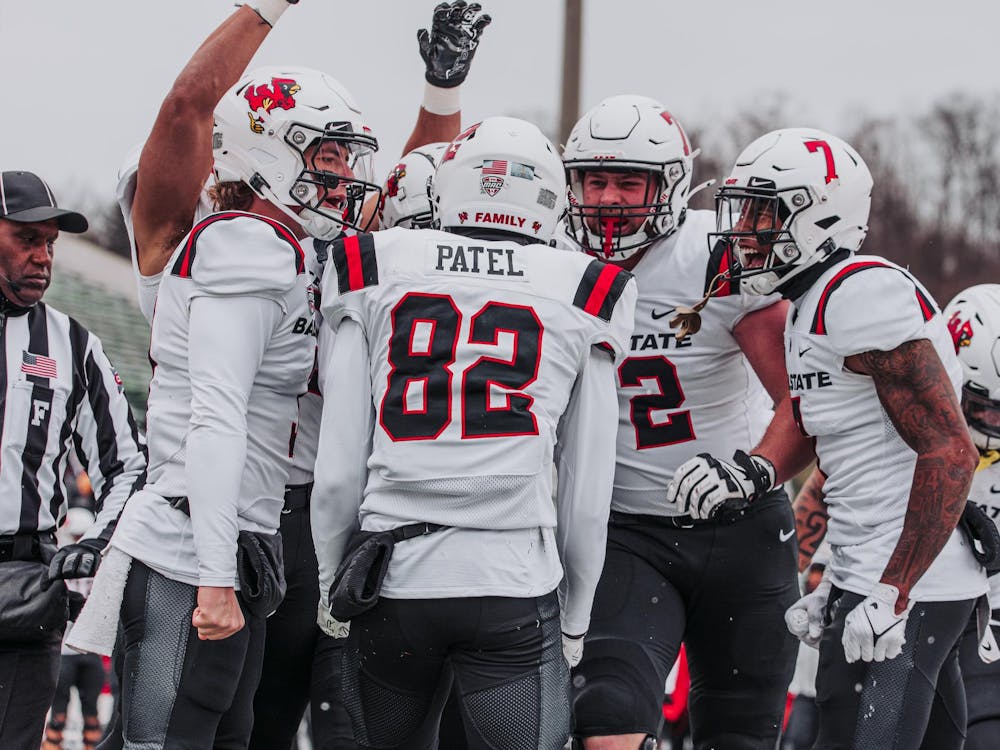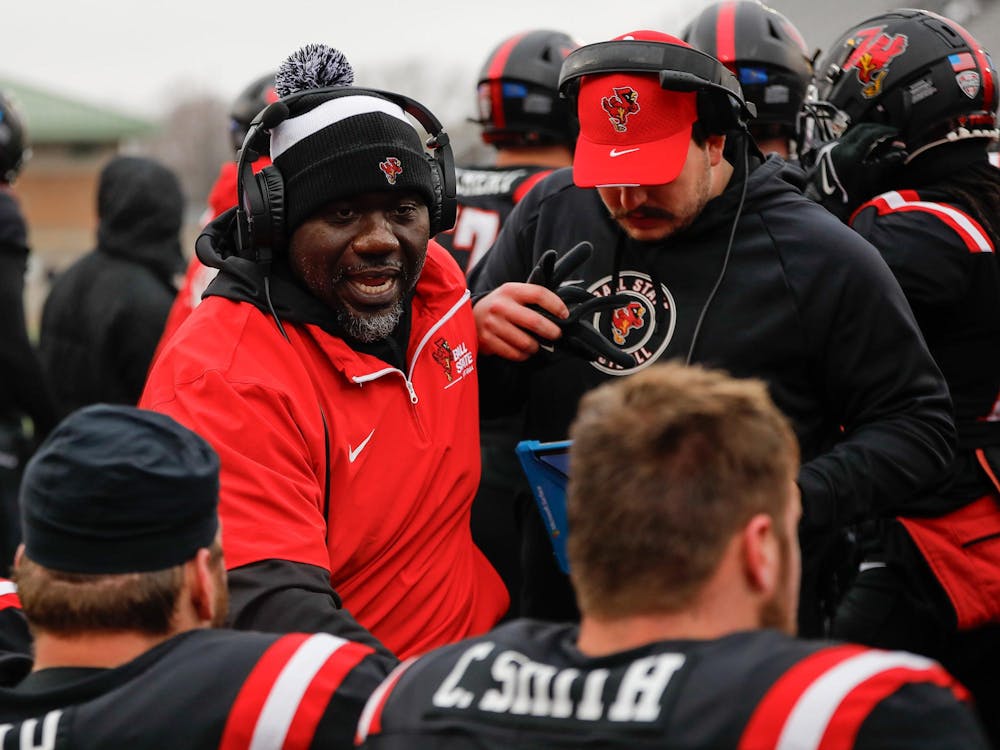Editor’s Note: Ashton Connelly is employed by North Dining, which is connected to Starship. He only spoke with President Mearns and Starship representatives.
Its lid locked in place, sealing the triple-insulated cabin to keep the special cargo fresh and secure, without hesitation, the roundly 2-foot robot began its mission.
The task was of the utmost importance, and with the help of its 12 cameras, ultrasonic sensors, radars, neural networks and other technological tools, the machine was ready to detect and maneuver around any obstacle that would find itself in the way.
The device wheeled its way down the ramp of the North Dining patio and turned south onto McKinley Avenue. Students coming and going to class populated the sidewalks, but as long as nothing was detected in its path, the robot cruised along at a consistent four miles per hour – the same rate of a typical person’s walking speed.
As the robot crossed the intersection of McKinley and Riverside Avenue, better known on campus as the scramble light, the customer – watching from Bracken House – recalled feeling a sense of excitement as he checked the machine’s location via the app, where users can check the progress of their order on a map of the campus.
In under 30 minutes, his special delivery and deliverer had almost met its destination.
The morning of Nov. 2, a Starship Technologies food delivery robot completed the first delivery made on Ball State University’s campus: a fresh box of donuts from North Dining to Ball State’s President Geoffrey S. Mearns, opening the service for use across campus.
“Well, I think [students] will have the same reaction I did,” Mearns said. “I felt a little temptation to start talking to him.”
Between the box of donuts and knee-high robot, Mearns said he was captured by the novelty of the experience. Mearns expressed that he is looking forward to seeing that same level of amusement across campus as the robots make their way alongside students.
Following the completion of Mearns’ donut delivery, students were open to order food from various on-campus dining options by using the Starship app, and by Wednesday afternoon, robots whirred around campus, seemingly capturing students with the amusement Mearns was hoping for.
“I love them,” Mickey Irwin, first-year elementary education major said. “They're already a part of campus, like you see them around, and it's like somebody to wave at like it's your friend.”
Irwin is from Russiaville, Indiana, a town with a population of 1,318 people, as opposed to Ball State’s reported enrollment of 19,337 students (Fall 2021). She believes high school students taking college visits will feel “blown away” when they see the Starship robots.
Erick Villeota, second-year student, lives off-campus, but said he plans to use the robots while he spends numerous hours on campus as an architecture major. Villeota said he has seen the same excitement from students Irwin has, though since he lives off campus, much of it has been digitally.
“I feel like every other Snapchat story is filled with these robots,” Villeota said. “So I think we as a university are excited to see them roaming around, and we're just kind of excited to have something new on our campus.”
Even Jimmy Kimmel, host of late night talk show "Jimmy Kimmel Live,” hosted Starship Technologies for a segment in 2017. In the segment, Kimmel follows a Starship robot, which then were partnered with DoorDash, as it completes an order from a local Hooters to the set.
Richaun Stewart, fourth-year musical theater major, also lives off-campus and plans to use the robots.Stewart said he feels like this initiative is a natural progression for not only University Dining but Ball State as a whole.
“I would have never [seen] it coming, but I'm not surprised at the same time for sure,” Stewart said. “Again, it's a great tool, and especially with everything in the modern day. We're just getting new technology each and every day and expanding and evolving as humans, so this was bound to happen.”
Dylan Barrett, university account manager for Starship Technologies, said Starship Technologies partnered with their first university campus in 2018, with Ball State marking the 29th campus deployment.
“We started with grocery delivery in the United Kingdom, and then expanded here stateside,” Barrett said. “[We] identified the campus environment as a perfect layout for robotic deliveries. I mean, you have medical facilities, dining facilities, housing facilities, cars, intersections, roads, but you are in somewhat of a close community as well, right? Our robots typically operate in a three, four or five mile radius, so considering all of those parameters, it's been absolutely the perfect environment for our robots to kind of build the volume and continue to grow the amount of deliveries.”
When it came to choosing Ball State specifically, Barrett commented on how the geography, infrastructure and dining services aided the process of adapting the robots to campus.
“Well, first of all, [it’s] how drivable the campus is. We don't see a ton of elevations, the walkways … they're so accessible and wide,” Barrett said, “But what I’m really excited for is the dining team we’ve partnered with. We've opened with over 10 restaurants already, and there's still so much to grow, so this is really just the tip of the iceberg of the overall service that we'll see as we continue to grow together.”
The agreement between Ball State and Starship Technologies is for $50,000 over an initial 60 month term.
Karen Adkins, senior director of auxiliary services for dining, catering and events, said the partnership with Starship to bring these robots to campus is the logical next step if University Dining wants to maintain their upward trend.
“I just think it's a service that gives students the opportunity to where if they're not feeling well, they don't want to leave their residence hall or for faculty and staff that don't want to leave the office, but they still want to get university dining opportunity of food, [the robots] gives them that opportunity to partake in some of their favorites that we offer,” Adkins said.
Adkins, along with other representatives from University Dining, visited Purdue University during the Spring 2021 semester to see the Starship robots in action. Since then, dining has been working to partner with Starship and bring these robots to campus.
Due to complications with COVID-19, the initiative was in the works for over a year, but the transition of the partnership had gone smoothly.
“We've heard from a lot of positive folks about the opportunity to be able to order and get what they like from University Dining so far,” Adkins said. “Starship asked about what my overall [thoughts] from day one [were], [and] it's really been a lot easier than I anticipated it being. When you start a new initiative, you always have the fears of what's going to happen, and this has been a smooth opening.”
Adkins said the biggest obstacle is payment integration. While at first, the dining robots were only taking credit or debit, by now they also take Dining Plus and Cardinal Cash. Adkins said eventually they want to be able to take meal plans.
As of now, the Starship robots are operating out of North Dining, The Atrium, Woodworth Dining and the Student Center Tally. Currently, there are 12 on-campus restaurants to choose from, according to the app.
The fact the robots can respond to completed deliveries, when being touched or when the lid is opened is one of Barrett’s favorite features.
“They’ll say ‘Thank you,’ ‘Have a great day’... you can have them play the Ball State fight song or a variety of other music that we alternate every single month, so as soon as you open the lid for delivery, it’ll play whichever song you select,” Barrett said. “ I think that's a really cool feature because it adds that human element and really creates that experience that you want to share.”
Users on the app can also select songs like Taylor Swift’s “Anti-Hero'' and Sam Smith’s “Unholy.”
Barrett seemed floored by the possibility of synchronizing the robots with Shafer Tower’s quarter-hourly chimes, commenting it would have to be something he and Starship would “bring our IT teams together to see what we could do”.
The robot’s sound systems are also equipped to sound sirens when picked up, according to the BSU Dining Services Starship Delivery Services website. However, in the event a robot is found stuck, Starship will “appreciate anytime someone helps the robot out of a sticky situation” but warns the bots are “very heavy,” weighing from 40-45 pounds without any cargo.
To express their appreciation of those who help, Starship Technologies posted a “thank you” video compilation to Facebook and TikTok Apr. 14, where clips show individuals assisting robots stuck in various situations.
To avoid situations where help would be needed, the robots are equipped with a variety of tools to help navigate obstacles and crowds.
“The robot will always defer to any pedestrian obstacle object or anything like that, so, when a person approaches it, it will slow down its speed. Once [a person or object] gets close enough, it'll come to a complete stop,” Barret said. “It has a 360 degree bubble of awareness, and that's created with the cameras, the ultrasonic sensors and the neural networks as well as radar. So, we can sense things approaching obstacles [or] upcoming crossings.”
Barrett said the robots have gone through several different variations over the years, with the fleet at Ball State being the most recent version. The lifetime of a robot is also relatively indefinite, as the rechargeable battery, configurable hardware and programmable software allows Starship to upgrade the existing fleet to be “operating at peak performance.”
Snow tires and cupholders in the interior compartment are more recent additions and configurations, Barrett mentioned.
The interior cabin is also triple-insulated, configurable (similar to a camera bag, with velcro dividers) and is sanitized by a Starship employee after each delivery and every night, Barrett said. Runners, or the Starship/University Dining employee, will also verify that every item in the order is accounted for.
The robots are active from 8 a.m. to 7:30 p.m. everyday, Barrett said. However, as services develop and new restaurants become accessible, Barrett is looking forward to expanded hours and services.
As the robots roll on throughout campus completing deliveries, Mearns and Starship Technologies both believe the robots will become another “fixture on campus.”
For now, it’ll be hard to ignore the vibrant plastic flag waving its way throughout crowds or the whirring sound of their rechargeable motors as they roll their way through campus to complete another order.
Contact Kyle Smedley with comments via email at kyle.smedley@bsu.edu or on Twitter @smedley1932. Contact Ashton Connelly with comments via email at ajconnelly@bsu.edu or on Twitter @AshtonJConnelly.





